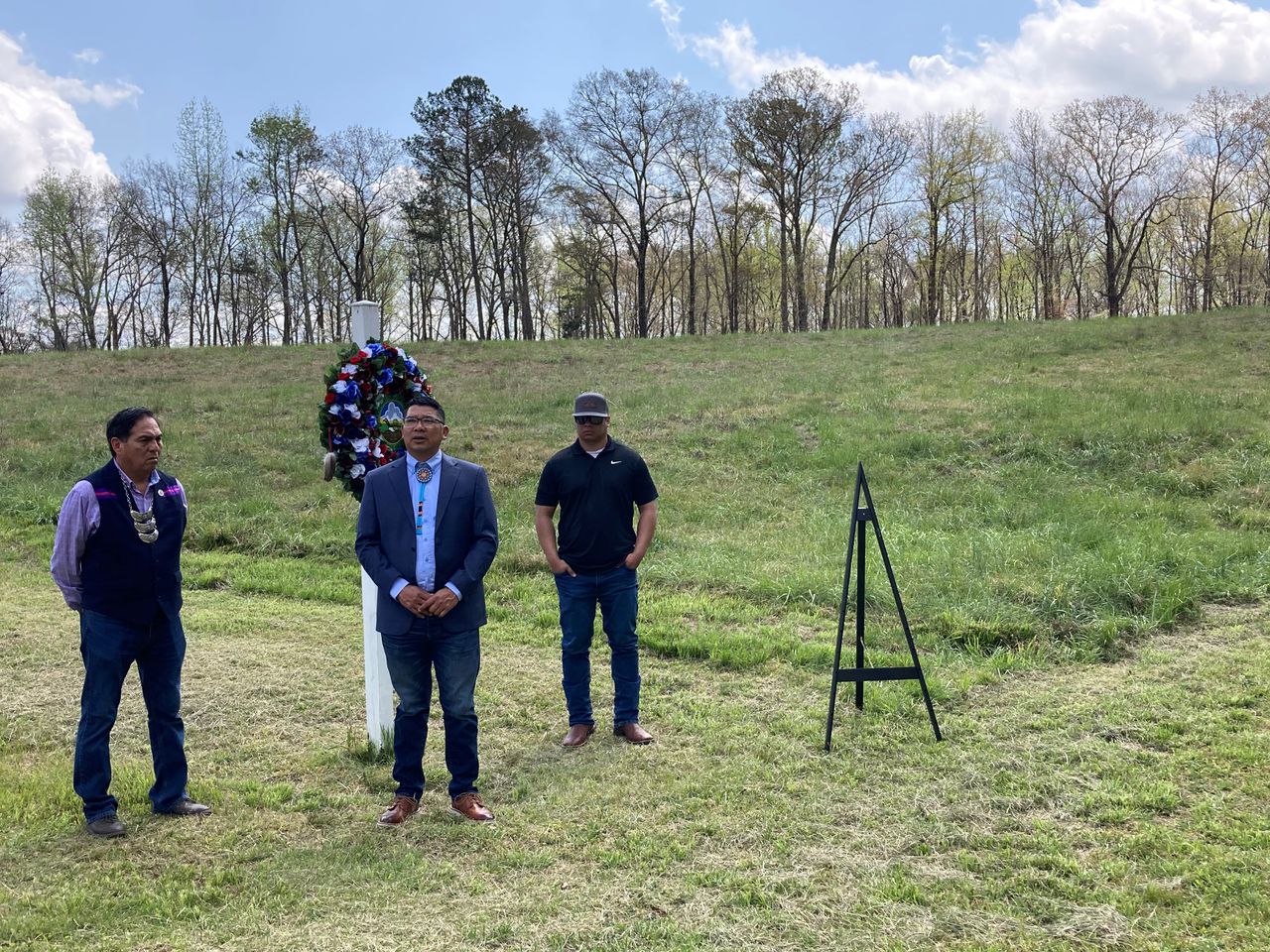Tribe seeks monument at Horseshoe Bend, Alabama site of deadliest battle with US troops
Leaders of the Muscogee Creek Nation announced plans Saturday for a memorial at the site of the Battle of Horseshoe Bend as a counterpoint to a monument honoring Gen. Andrew Jackson, the principal architect of the tribe’s massacre and removal.
The announcement came during an event honoring the 209th anniversary of the bloodiest clash between U.S. forces and Native American warriors at Horseshoe Bend National Military park in Alabama. More than 800 citizens and warriors of the Muscogee Creek Nation perished trying to defend their final holdout at a bend in the Tallapoosa River.
A marker commemorates “General Andrew Jackson and his brave men.” Nothing at the site of the battle honors the lives of the Native Americans who died there.
“Later today, we will visit and lay a wreath at the field that was once soaked with the blood of over 800 Creek warriors and, unfortunately, women and children,” said Chief David Hill. “We do this in remembrance, but it is a temporary monument. The flowers will fade away and wither. That is why today, we are announcing our intention to seek to permanently honor our people’s struggles here.”
Horseshoe Bend was the final battle of the Creek War. Members of the Muscogee Creek Nation signed a treaty with the United States that was supposed to allow them to stay in Alabama. More than a decade later, President Andrew Jackson signed the Indian Removal Act that forced tribes to leave the Southeast and resettle in Oklahoma.
“Some people call it a battle,” said Jonodev Chaudhari, ambassador for the Muscogee Creek Nation. “A good case can be made that it was a massacre.”
In the years and months leading up to the Battle of Horseshoe Bend, Jackson’s forces attacked and burned Native American settlements across the South. Refugees from these communities gathered at Horseshoe Bend before the battle. Red Stick warriors tried to defend the settlement, but lost to an onslaught of more than 2,000 militia members and U.S. troops.
“They were here to survive,” Chaudhari said. “And that was the group that Andrew Jackson came here to annihilate.”
The Muscogee Creek Nation lost more than 22 million acres, more than half of the land that is currently Alabama. Most of the survivors were forced to walk to Oklahoma during the Trail of Tears.
Hill said the tribe has begun the process to design a memorial. After that, they will seek approval from the National Park Service to place the monument at the site of the battle.
A line of white posts marks the spot where Creek warriors erected a barrier against the U.S. troops in 1814. On one side of the field, troops under Jackson’s command positioned guns and armaments. A stone monument honors them and plaques describe how they advanced on the tribe.
The other side of the line contains no monuments or plaques.
“When you go around here and you read the signs, it’s from one perspective,” said Del Beaver, second chief of the Muscogee Creek Nation. “It’s not our perspective.”
Several leaders and citizens of the Muscogee Creek Nation in Oklahoma traveled to Alabama for the event. The tribe commemorates the battle every year but hasn’t been able to do so in person since 2019. It is a somber event, officials said.
“History may not always be pleasant, but its accurate portrayal is essential for healing, growth and most of all understanding,” Hill said.
Barbara Taggart, superintendent of Horseshoe Bend National Military Park, said she has been trying to incorporate more Muscogee Creek history into the park since she arrived seven years ago. The museum recently reopened with redesigned exhibits.
Still, Muscogee leaders said they hoped the sacrifices made by warriors would also be recognized. At around noon, tribal leaders placed a wreath at the battle site.
“This wreath here is temporary,” said Galen Cloud, a member of the Muscogee Creek National Council. “I hope we can get something here that is not temporary.”
